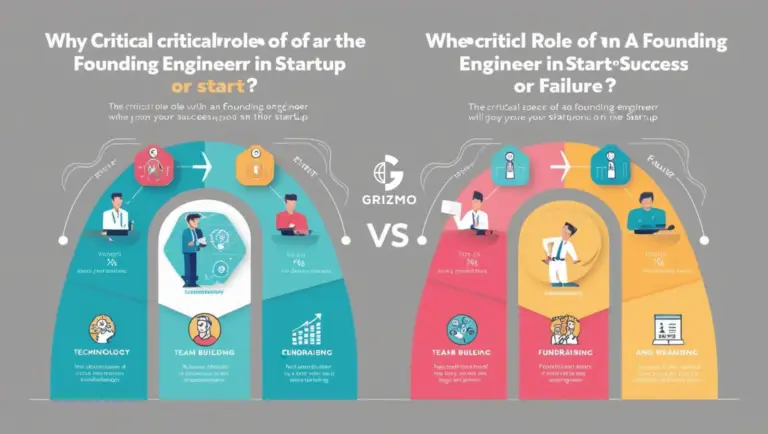Introduction
Thank you for reading this post, don't forget to subscribe!In today’s rapidly evolving tech landscape, the role of a founding engineer cannot be overstated. For startups, which often operate under tight deadlines and limited resources, this individual acts as the backbone of product development and company culture. This blog explores the vital importance of a founding engineer and how their skills and influence can set the stage for success or contribute to failure.
Importance of a founding engineer in startups
A founding engineer shapes the earliest versions of a product, aligning technical capabilities with business goals. Their decisions not only affect product performance but also determine how the company operates internally and how it is perceived externally. Hiring the right founding engineer can mean the difference between building a thriving enterprise or facing significant struggles.
Overview of the blog’s key points
This blog will discuss what defines a founding engineer, their critical contributions to product development, the influence they have on company culture, and their role in attracting top talent. We will also examine how a competent technical leader impacts investor confidence and discuss the challenges startups may face without the right engineer. Lastly, we’ll provide insights on what qualities to look for in a founding engineer and best practices for hiring.
Defining a Founding Engineer
Roles and responsibilities
A founding engineer is typically one of the earliest hires in a tech startup, responsible for building the core technology. Their responsibilities often include:
- Designing and developing the product’s architecture.
- Implementing features and functionalities based on user feedback.
- Establishing coding standards and practices that guide the development process.
- Leading a small team of engineers and coordinating with other departments, such as product management and marketing.
Difference between founding engineers and regular engineers
While both roles involve technical skills, the founding engineer typically takes on more strategic responsibilities. They are expected to have a broader vision for the product and actively participate in shaping the company’s direction. Regular engineers may focus more on individual tasks rather than the overarching strategy of product development.
Speed of development
Startups often operate on a tight timeline. A competent founding engineer can expedite the development process significantly by making quick, informed decisions. They can guide teams through challenges with their experience, ensuring that the product iterates swiftly without compromising quality.
Quality and innovation in product creation
Innovation is at the heart of any successful startup. A founding engineer with a strong technical background can leverage new technologies to create unique solutions that stand out in the market. They not only ensure that the product is functional but also aim for high standards of quality, which is crucial for user satisfaction and future scalability.
Influence on Company Culture
Setting technical and work culture standards
The founding engineer helps establish the technical framework and work culture within the startup. Their approach to problem-solving, collaboration, and communication becomes a model for existing and future team members. A positive culture fosters creativity, encourages open dialogue, and ultimately leads to better results.
Impact on team morale and collaboration
A founding engineer’s leadership style can significantly impact team morale. By promoting a collaborative environment and recognizing individual contributions, they can inspire their teams to work harder and communicate more effectively. This, in turn, leads to better productivity and a more harmonious workplace.
Attracting Talent
Role in attracting other top talents
A founding engineer’s reputation can be instrumental in attracting additional talent. Skilled professionals often want to work with leaders who have a solid technical vision and a proven track record. The presence of a competent founding engineer can make the startup appealing to prospective employees, ultimately building a stronger team.
Importance of reputation in the tech community
The tech community is tight-knit, and word quickly spreads about company leadership. A founding engineer with respect and recognition in the industry can enhance the startup’s credibility. Their influence can not only improve hiring prospects but also foster relationships with potential partners or clients.
Fundraising and Investor Confidence
Confidence investors have with a competent technical leader
Investors are more likely to back a startup with a capable founding engineer at the helm. They see these leaders as crucial for navigating technical challenges and ensuring product viability. A confident technical leader can provide a sense of security, reassuring investors of the startup’s potential for success.
Examples of engineering leadership swaying investor decisions
There are numerous examples of startups that succeeded largely because their founding engineers were able to demonstrate technical prowess. Having a well-known engineer who has previously worked on successful projects can be a compelling factor that sways investor decisions, leading to essential funding rounds.
Challenges Without the Right Engineer
Potential risks and setbacks
The absence of a competent founding engineer can lead to a multitude of issues. Poor technical decisions can result in slow development, low-quality output, and a shaky product launch. Companies may also struggle with establishing a cohesive team culture, which can result in high turnover rates.
Real-life examples of failures due to poor technical leadership
Several startups have faced significant challenges due to inadequate technical leadership. For instance, there have been cases where startups with an excellent business model failed simply because their products were poorly designed or unreliable. These examples underscore the necessity of hiring a qualified founding engineer.
Finding the Right Fit
Qualities to look for in a founding engineer
When searching for this essential hire, consider the following qualities:
- Strong technical expertise and problem-solving skills.
- Experience in building and launching products.
- Ability to communicate effectively with both technical and non-technical team members.
- A collaborative mindset that encourages teamwork and innovation.
Best hiring practices and sources to consider
Utilize a mix of strategies when searching for a founding engineer, such as:
- Networking within industry circles and attending tech conferences.
- Leveraging connections on professional platforms like LinkedIn.
- Engaging in targeted job postings in tech-focused communities.
Conclusion
In summary, hiring the right founding engineer plays a critical role in establishing a successful startup. From shaping product development to influencing company culture and attracting both talent and investment, a founding engineer’s impact is significant and multifaceted. As such, it is essential for startups to approach this hiring decision with care and thoughtfulness. The right choice could indeed make all the difference in navigating the complexities of starting a new venture.
More About Grizmo Labs, Visit: www.grizmolabs.com



